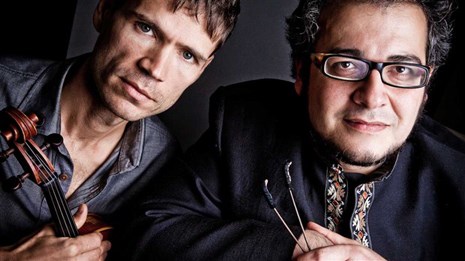Moody Amiri at Presentation House Theatre, Friday, Oct. 17 at 8 p.m. as part of Capilano University's Global Roots series. Tickets $28/$25/$15. For more info visit capilanou.ca/blueshorefinancialcentre.
It was their first time together.
Amir Amiri hammered the santur and Richard Moody wielded his viola.
"It worked. It was one of those immediate things," Amiri recalls.
Listening to Amiri tell it, the formation of the duo felt as inevitable as Simon and Garfunkel or Smith and Wesson.
"I remember: right then and there I told him, 'You want to play together?' And he said to me, 'No, I actually don't. I'm too busy. I want to do yoga for the rest of my life.'" Some musicians would have gone looking for another viola player, but Amiri was certain he'd found something special.
"He's a great contributor," Amiri says of Moody. "He knows when to stay out of your way. That's a gift."
As part of his yoga training, Moody has made several sojourns to India. Amiri believes the music he heard there became part of him.
"The melodic lines have actually gone through his body."
Amiri frequently likens the art of music with the art of conversation, treasuring musicians who know when to listen and when to express themselves.
Musically speaking, Moody is an outstanding conversationalist.
Besides his harmonic knowledge, Moody has an innate sense of rhythm, honed from his days playing roots music.
"You can't really find that as widely among classical musicians," Amiri says.
It turned out the yogi's endurance was no match for Amiri's persistence.
"I kept bugging him and bugging him and bugging him and finally he just gave in," he says.
The duo have been together for nearly a decade, but Safar is their first CD.
Featuring 12 tracks, the album has deep roots in Persian classical music but the presentation is decidedly modern.
When preparing to record the album, Amiri thought about the effect of YouTube and the easy accessibility it provides to the best music.
Many classical Persian songs are more than 15 minutes long. The longest track on Safar is a six minutes, 41 second interpretation of Ravel's Bolero. Other tunes are barely more than two minutes.
"Short, to the point, and out of my way. That was the concept for me," Amiri explains. "Intro, outro, centre, done."
Most of the songs are brief but the recording was painstaking.
Financed by credit cards, Amiri and Moody recorded Safar four times.
"I wanted to make it something that doesn't make me want to puke, doesn't make me want to revolt when I listen to it," Amiri explains.
Amiri uses words like crave and longing when he describes the music he loves. But he's always mindful of time.
"Yes, it's beautiful, but you have to have time and/or capacity to engage with beauty."
In terms of songwriting, Amiri's search for melodic lines is similar to a sculptor's hunt for organic shapes in marble.
Amiri writes the music and improvises on his composition until he finds something worth keeping. Then he writes again, repeating the process and throwing out everything that doesn't work until he's left with something beautiful.
- - - - - - - - - -
Amiri tells the story of seeing his first santur in tones of awe.
"I was just so taken by this instrument, I think it
chose me."
He was at his aunt's house in Tehran when he saw the santur played by the musician that would be his master.
The 72-string instrument sounded like piano, but "so much better than piano."
For Amiri, it was the music of the cosmos.
"It was a bunch of stars falling off the sky and - if the stars break when they hit the ground - it would sound like that."
His teacher spoke at length about the links between poetry, literature and music, but never raised his voice.
Coming from a family where volume was a conversation requirement, his master's soft, kind voice was captivating.
It also offered Amiri a lesson.
"Silence, oddly enough, has a lot to do with the way that you can express yourself," he says. "The way you put silence amongst these notes, you can have the same expression but with a totally different meaning."



